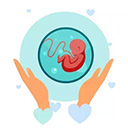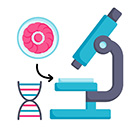
Understanding Thyroid Disorders and Infertility: A Specialist’s Journey
A few years ago, I met Rachel, a 32-year-old teacher who came to my clinic after struggling to conceive for over a year. She was healthy, active, and had regular cycles, yet every pregnancy test came back negative. Frustrated and confused, she wanted answers. Her story reminded me of how seemingly unrelated issues, like thyroid disorders, can play a hidden role in infertility.
After running a series of tests, we found the root cause of Rachel’s struggles: hypothyroidism, a condition where the thyroid gland doesn’t produce enough hormones. It was a turning point in her journey and a reminder of how vital the thyroid is to reproductive health. Let me share what I’ve learned about thyroid disorders and how they impact fertility.

What Are Thyroid Disorders?
The thyroid is a small, butterfly-shaped gland located in the neck. It might be small, but it plays a massive role in regulating metabolism, energy, and hormone balance. When the thyroid isn’t functioning properly, it can disrupt almost every system in the body, including the reproductive system.
Thyroid disorders most commonly linked to infertility include:
- Hypothyroidism: When the thyroid doesn’t produce enough hormones, it can affect ovulation, menstrual cycles, and even implantation.
- Hyperthyroidism: An overactive thyroid can lead to irregular periods, miscarriages, or difficulty conceiving.
- Hashimoto’s Thyroiditis: An autoimmune condition where the immune system attacks the thyroid, often leading to hypothyroidism.
Dr. Emily Taylor, an endocrinologist, explains,
“The thyroid gland is like a thermostat for the body. When it’s out of balance, everything, including fertility, can be thrown off.”

How Thyroid Disorders Impact Fertility
The relationship between thyroid health and fertility is complex but undeniable. Here are the main ways thyroid disorders can affect conception:
- Disrupted Ovulation: Hormonal imbalances caused by thyroid disorders can prevent the release of a mature egg, making it impossible to conceive naturally.
- Irregular Cycles: Thyroid dysfunction often leads to irregular periods, making it harder to track ovulation and time intercourse.
- Increased Risk of Miscarriage: Uncontrolled thyroid issues, particularly hypothyroidism, can increase the risk of early pregnancy loss.
- Implantation Challenges: Thyroid hormones are essential for a healthy uterine lining, which is crucial for implantation and sustaining a pregnancy.
In Rachel’s case, her hypothyroidism had led to irregular ovulation, which was why she wasn’t getting pregnant despite having regular cycles.
Diagnosing Thyroid Disorders
One of the challenges with thyroid-related infertility is that the symptoms are often subtle or mistaken for other issues. Common signs of thyroid dysfunction include:
- Fatigue
- Unexplained weight changes
- Cold intolerance (in hypothyroidism) or heat sensitivity (in hyperthyroidism)
- Hair thinning or hair loss
- Depression or anxiety
To diagnose thyroid disorders, we rely on blood tests to measure levels of TSH (thyroid-stimulating hormone), T3, and T4. In Rachel’s case, her TSH levels were significantly elevated, pointing to hypothyroidism. We also checked for thyroid antibodies to rule out Hashimoto’s Thyroiditis.
Treating Thyroid Disorders for Fertility
The good news is that thyroid disorders are treatable, and with proper management, many women can conceive and carry healthy pregnancies. Treatment options depend on the specific condition:
- Hypothyroidism: The standard treatment is synthetic thyroid hormone replacement (levothyroxine), which restores hormone levels to normal. Once the thyroid is under control, ovulation often resumes.
- Hyperthyroidism: Treatment options include antithyroid medications, beta-blockers for symptom management, or even surgery in severe cases.
- Lifestyle Adjustments: Managing stress, maintaining a healthy weight, and eating a balanced diet rich in iodine and selenium can support thyroid health.
Dr. Ahmed Karim, a reproductive endocrinologist, highlights,
“The key to treating thyroid-related infertility is early detection and consistent monitoring. A well-managed thyroid is essential for reproductive success.”
Emotional Impact of Thyroid-Related Infertility
One thing I’ve learned from patients like Rachel is that thyroid disorders don’t just affect the body—they impact the mind. The unpredictability of the condition, coupled with fertility struggles, can lead to anxiety and frustration.
Rachel once shared with me, “I felt like my body was broken, and I couldn’t figure out why. It was such a relief to finally have an answer and a plan.” Her words underline the importance of clear communication and emotional support during treatment.
Rachel’s Journey to Motherhood
After starting thyroid hormone replacement therapy, Rachel’s hormone levels returned to normal within three months. We monitored her cycles closely and recommended timed intercourse to maximize her chances of conception. Six months later, she called me with the news: she was pregnant.
Seeing Rachel hold her newborn son a year later was a moment of pure joy. Her story is a testament to the power of accurate diagnosis, tailored treatment, and the resilience of the human body.
Final Thoughts
As a fertility specialist, I’ve seen how thyroid disorders can silently disrupt the dream of parenthood. But with the right diagnosis and treatment, the odds of success are high. Whether it’s managing hypothyroidism, treating hyperthyroidism, or addressing autoimmune thyroid conditions, there’s hope for every patient.
If you’re struggling with infertility and suspect a thyroid issue, don’t wait. Get tested, seek support, and take the first step toward your dream of becoming a parent. Your journey might have challenges, but with the right care, the destination is well worth it.







